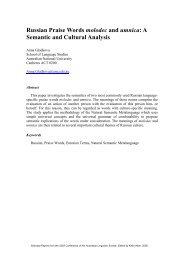ALS 2010 Annual Conference Programme - Australian Linguistic ...
ALS 2010 Annual Conference Programme - Australian Linguistic ...
ALS 2010 Annual Conference Programme - Australian Linguistic ...
Create successful ePaper yourself
Turn your PDF publications into a flip-book with our unique Google optimized e-Paper software.
Plenary 2: Mary Laughren<br />
University of Queensland<br />
m.laughren@uq.edu.au<br />
Changes in grammatical case marking in <strong>Australian</strong> languages:<br />
triggers and consequences<br />
The core grammatical cases recognized in <strong>Australian</strong> languages<br />
are typically labelled as Nominative, Accusative,<br />
Dative, Ergative and Absolutive. Linguists have traditionally<br />
categorized cases into a range of types, e.g., syntactic,<br />
inherent, grammatical, semantic, morphological.<br />
I will draw on some of the insights behind these distinctions<br />
in examining attested examples of changing case marking<br />
systems in some Pilbara languages (e.g., Panyjima and<br />
Ngarluma), in Gurindji, Warlpiri, and Jingili, and in Tangkic<br />
languages. My focus will be on the interplay between<br />
case marking, case type and case assigner and the syntactic<br />
and pragmatic contexts in which different combinations of these features<br />
may occur as I try to discern what triggers a change in case-marking and what<br />
further change it may lead to.



